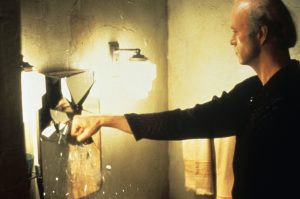Monday, August 26 at 7pm
MANHUNTER
Michael Mann (U.S. 1986) 119 min. 35MM. With William Petersen, Joan Allen, Brian Cox.
Five years after we began the annual Monday series opening night with a Michael Mann rotation, we once again show what many believe is the director’s best film. Before Hannibal, CSI and Law & Order, there was Manhunter. In pursuit of a serial killer, a detective draws on extreme powers of empathy to enter not the killer’s mind, but his dreams. The threshold between reality and fantasy is made manifest on the screen, where Mann’s images rebound as carefully constructed symbols.
THE BLUE GARDENIA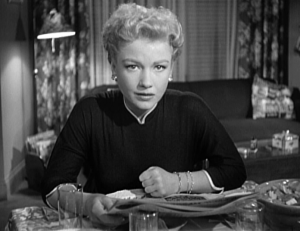
Fritz Lang (U.S. 1953) 90 min. With Anne Baxter, Richard Conte, Ann Sothern.
A noir set in a Langian world, where sympathetic characters are doomed by malignant forces. A despondent switchboard operator is seduced by a womanizer, then suspected of murdering him; a newspaper reporter intervenes, epitomizing the director’s cynical view of mass communication and its deceits.
MURDER IN HARLEM
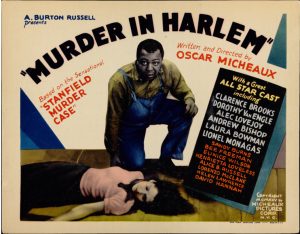
Oscar Micheaux (U.S. 1935) 98 min. DCP. With Clarence Brooks, Dorothy Van Engle, Andrew Bishop.
A reverie on the famed Leo Frank-Mary Phagan murder case, Murder in Harlem begins as a black night watchman finds the body of a white woman. He calls the police, who arrest him. Revisiting the murder several times in a Rashomon-like structure, pioneering black director Oscar Micheaux crafts a powerful narrative teeming with nearly uncontrollable passions.
Monday, September 16 at 7pm
HIGH SCHOOL II

Frederick Wiseman (U.S. 1994) 220 min.
Twenty-five years after his Vietnam-era portrait of a Philadelphia high school, America’s greatest documentarian focused on a successful alternative high school in New York’s Spanish Harlem. In the immediate aftermath of the Rodney King verdict, the racially diverse student body and teachers discuss Shakespeare, conflict resolution and how to accommodate a fifteen-year-old mother’s return to school.
MAGNIFICENT OBSESSION
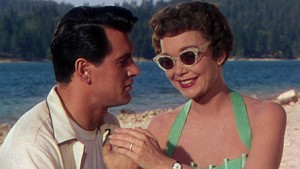
Douglas Sirk (U.S. 1954) 108 min. 35MM. With Jane Wyman, Rock Hudson, Agnes Moorehead.
A philanthropist doctor’s death and the subsequent blinding of his grieving widow are both indirectly caused by the recklessness of Rock Hudson’s spoiled millionaire in Douglas Sirk’s uber-melodrama, lusciously told in saturated Technicolor and expressive mise-en-scène. Driven by guilt, the playboy turned eminent surgeon courts Wyman, whose blindness he aims to cure.
SOUTH (SUD)
Chantal Akerman (France/Belgium 1999) 70 min.
Inspired by her love of William Faulkner and James Baldwin, renowned director Chantal Akerman had planned to produce a meditation on the American South. Days before she was to begin filming, James Byrd, Jr., a black family man, was severely beaten and murdered by three white men in Jasper, Texas. South addresses the racially motivated killing via tracking shots through Jasper’s black neighborhoods, interviews with townspeople and a sobering ride down the long road on which Byrd was brutally dragged, chained to the back of a truck until pieces of his body were left scattered in the landscape.
WEEKEND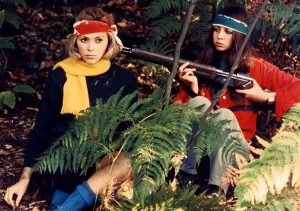
Jean-Luc Godard (France 1967) 105 min. 35MM. With Mireille Darc, Jean Yanne, Jean-Pierre Léaud. French with English subtitles.
This scathing late-sixties satire from Jean-Luc Godard is one of cinema’s great anarchic works. Determined to collect an inheritance from a dying relative, a bourgeois couple travel across the French countryside while civilization crashes and burns around them. Featuring a justly famous sequence in which the camera tracks along a seemingly endless traffic jam, and rich with historical and literary references, Weekend is a surreally funny and disturbing call for revolution, a depiction of society reverting to savagery, and — according to the credits — the end of cinema itself.
MOUCHETTE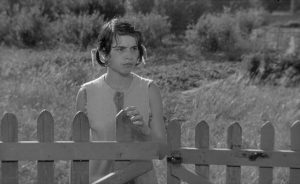
Robert Bresson (France 1967) 78 min. 35MM. With Nadine Nortier, Jean-Claude Guilbert, Marie Cardinal. French with English subtitles.
Faced with a dying mother, an absent, alcoholic father and a baby brother in need of care, young Mouchette seeks solace in nature and daily routine, a respite from her economic and pubescent turmoil. Bresson plumbs great reservoirs of feeling with this searing portrait of human desperation, elevating his trapped protagonist into one of cinema’s great tragic figures. An essential work of French filmmaking.
MEET ME IN ST. LOUIS

Vincente Minnelli (U.S. 1944) 113 min. DCP. With Judy Garland, Margaret O’Brien, Mary Astor.
The creator of many musical milestones, Vincente Minnelli met his future collaborator (and wife) on the set of this beloved movie, which depicts the everyday lives of a St. Louis family eagerly awaiting the 1904 World’s Fair. The film showcases the director’s ravishing evocation of an era gone by and the great entertainer’s admired contralto voice, debuting now familiar standards like “Have Yourself a Merry Little Christmas.”
THREE BY WARHOL
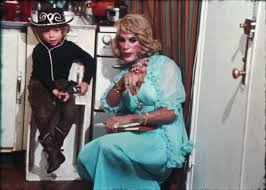
Once again highlighting specimens from Pop provocateur Andy Warhol’s 600-plus film oeuvre, the Monday Intro to Film series presents a selection of the artist’s films: John and Ivy (1965, 33 min. 16MM), a domestic portrait of cinematographer John Palmer and fashion model Ivy Nicholson; a selction of his famous Screen Tests (Reel 13, 1964-66, c. 30 min. 16MM); and Ari and Mario (1966, 66 min. 16MM), in which cultural icon Nico (of the Velvet Underground), frantic to find a last-minute babysitter for her son, Ari, calls in a favor from drag queen and fellow Factory Superstar Mario Montez. Antics ensue…
Monday, November 11 at 7pm
CITIZEN KANE
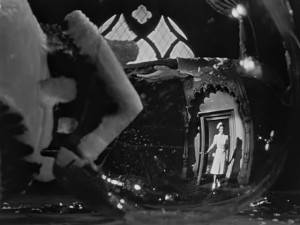
Orson Welles (U.S. 1941) 119 min. DCP. With Orson Welles, Joseph Cotton, Dorothy Comingmore.
Following the death of a publishing tycoon, reporters scramble to discover the meaning of his final utterance. Welles and cinematographer Gregg Tolland use chiaroscuro lighting, deep-focus cinematography and a labyrinthine ashback structure to imagine the monstrous hollowness of the American dream. A modernist landmark of cinematic style and storytelling, Citizen Kane is considered by many to be the greatest film ever made.
Monday, November 18 at 7pm
GERMANY YEAR ZERO
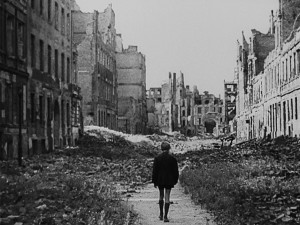
Roberto Rossellini (Germany, Italy 1948) 78 min. DCP. With Edmund Meschke, Franz Gruger, Ingetraude Hinze. German with English subtitles.
The concluding chapter of Rossellini’s “War Trilogy” is the most devastating, a portrait of an obliterated Berlin seen through the eyes of a twelve-year-old boy. Young Edmund—mostly left to wander unsupervised— is ensnared in the black-market schemes of a group of teenagers and comes under the nefarious influence of a Nazi-sympathizing ex-teacher.
Monday, December 2 at 7pm
PATHER PANCHALI
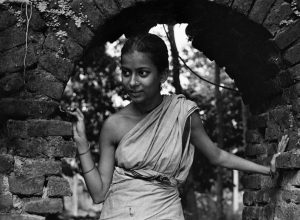
Satyajit Ray (India 1955) 125 min. DCP. With Subir Banerjee, Uma Das Gupta, Kanu Banerjee. Bengali with English subtitles.
Satyajit Ray’s debut is the first film in a trilogy that introduced the world to an eloquent new cinematic voice. Based on two books by Bibhutibhusan Banerjee and comprising the most richly humane movies ever made, these essential works depict rural Bengali life via a naturalistic but poetic evocation of several years in the life of a family. Pather Panchali follows both free-spirited Apu as a young boy and the women who will help shape him: his independent older sister, his harried mother, and his mischievous elderly “auntie.“ Two decades after its original negatives were burned in a fire, Ray’s breathtaking milestone of world cinema has risen from the ashes in a meticulously reconstructed new 4K restoration thanks to Janus Films and the Criterion Collection in collaboration with the Academy Film Archive at the Academy of Motion Picture Arts and Sciences.
Monday, December 9 at 7pm
THE SOUTHERNER
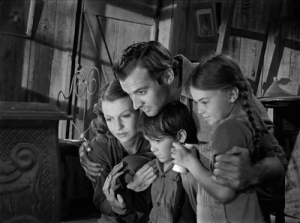
Jean Renoir (U.S. 1945) 92 min. 35MM. With Zachary Scott, Betty Field, Beulah Bondi.
This story of one year in the life of a farmhand (Scott) who is tired of working for others and decides to go it alone with his wife, his elderly mother and his small son, was shot almost entirely on location in a cotton field in California’s San Joaquin Valley, lending pictorial realism to the man’s development of a patch of wasteland, and his conflicts with a malicious neighbor, the elements and malnutrition. By fixing his characters to the landscape through commonplace details, Renoir reduces the monolithic theme of social injustice to the scale of one man (adapted from Pacific Film Archive notes).
The “only work of a personal nature carried out in Hollywood… The Southerner is one of Renoir’s most direct, most simple films, and certainly one of his most moving.” – R. Emmet Sweeney, Streamline
